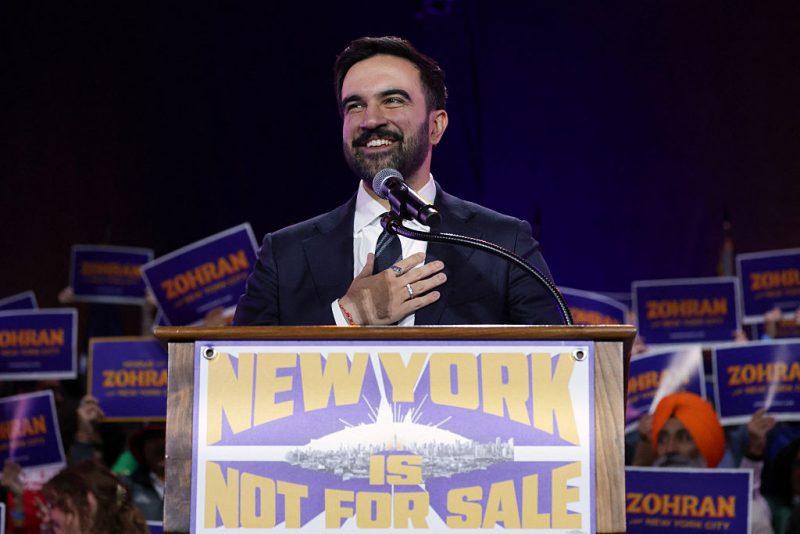
OAN Commentary by: Adonis Hoffman
Wednesday, November 5, 2025
Democrats embrace Zohran Mamdani at their own peril. He is an anomaly, not the answer. Instead of offering him a ringing endorsement, they would be wise to draw a bright red line around him, and, if they must, heap praise from afar. Way afar.
Now that he is Mayor-elect of New York City, there will be some who want to take a page from his playbook. Doing so is a game plan for perennial irrelevance.
Mamdani’s political skill is undeniable. He has mastered the art of converting grievance into momentum and indignation into influence. He knows how to make the language of protest sound like policy. His gift lies in tapping into the anger of the disaffected—young voters, immigrants, and progressives who believe the system has failed them.
His rise in New York politics is not accidental; it reflects the ability of a smart, relentless candidate to animate a movement within a confined ideological space. But make no mistake; that does not make him a national model.
Endorsing Mamdani is exactly the wrong thing to do for Democrats. Mamdani speaks for a neighborhood, not a nation.
He is a borough politician with a borough worldview. He is a local phenomenon, not a national prototype; a product of the five boroughs, not the fifty states. Beyond New York’s borders, his appeal evaporates. His brand of politics thrives only in the dense echo chambers of New York City, where progressive orthodoxy is rarely challenged and dissent is dismissed as betrayal. Outside that narrow geography, his message finds little purchase. Views that excite applause at a rally can alienate voters in the rest of the country.
Mamdani’s views on Israel, immigration, and the economy are far removed from the values of most Americans, including millions of centrist voters that decide elections. His posture on Israel is accusatory and historically shallow. It is not just critical; it is condemnatory, steeped in a moral absolutism that undermines decades of bipartisan support for America’s closest democratic ally. From Truman’s early recognition of the state of Israel in 1948 to Trump’s recent reaffirmations, the U.S.–Israel alliance has been an article of faith in American foreign policy. Mamdani rejects that heritage, seeking to replace a real real relationship with divisive rhetoric.
On immigration, he mistakes compassion for policy. Open borders and blanket amnesty may sound humane, but they disregard economic capacity and civic cohesion. The late Senator Daniel Patrick Moynihan—himself a New York Democrat—warned against “defining deviancy down.” The same logic applies here: defining realism down. No matter how well-intentioned, compassion without structure is chaos, and idealism without limits is self-indulgence.
When it comes to economics, Mamdani preaches redistribution but not growth. He speaks the language of grievance, not of governance. This is what might be called the “Mamdani Mistake”, that is, confusing activism with alignment, and mistaking fervor for a future. His victory in Queens does not translate into a mandate for the nation. His movement is loud, but it is not large. It energizes activists, not ordinary Americans. The Democratic Party’s problem is not that it has lost its voice, but that it keeps mistaking the loudest one for the truest. It confuses movement with mandate and mistakes intensity for insight.
A recent Pew survey found that nearly seventy percent of Democratic voters identify as moderate or only somewhat liberal, and swing-state independents rank “pragmatism” as the most important quality in a political leader. The data reveal what common sense already knows: most Americans live near the center and prefer persuasion to purity. Americans admire conviction but distrust fanaticism.
Mamdani’s rise should be studied, not celebrated. He has exposed genuine frustration among a generation that feels unseen, but his prescriptions are neither practical nor sustainable.
To redline Mamdani is not to silence dissent, but to signal identity. It is to say that a big-tent party built on inclusion still believes in balance. Admiration for Mamdani’s energy is safe; imitation of his ideology would be fatal. As history shows, parties that lose the middle lose the mandate. Democrats need a majority not a martyr. So they should study Mamdani as a phenomenon, not follow him as a prophet. He is a case study in local insurgency, not a blueprint for national renewal. To endorse him is to confuse exception with example, and to risk estranging the broad middle that determines power in America.
The cautionary tale here is clear: Democrats embrace Mamdani at their own peril. To elevate him or adopt his brand of politics is to mistake noise for numbers, and activism for advantage. His views on Israel, immigration, and the economy are far removed from the centrist instincts of most Americans, including millions of moderate Democrats who still believe in borders, balanced budgets, and bipartisan cooperation.
Mamdani’s hard-left positions may energize activists, but they alienate the voters Democrats most need to regain power—suburban professionals, ethnic moderates, and disillusioned independents. The voters who will decide future elections live in Ohio, Pennsylvania, and Arizona, not Astoria. They are pragmatic, not performative; aspirational, not accusatory. They seek balance, not blame.
Democrats should redline Mamdani—not to silence him, but to define the limits of their own national identity.
(Views expressed by guest commentators may not reflect the views of OAN or its affiliates.)
Adonis Hoffman, an Independent Counsel, writes on business, law and policy. He served in senior roles at the FCC and the U.S. House of Representatives.
What do YOU think? Click here to jump to the comments!
Sponsored Content Below

